Module 4 Great inventions
九年级英语上册 Module 4 Great inventions课件 外研版
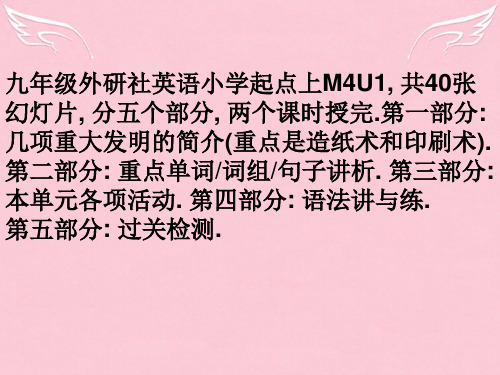
---Is an online magazine the same as an ordinary magazine? ---No, there are some differences. An online magazine is published on the Internet, and can be read using a computer. An ordinary magazine is published on paper.
printing
publishing(4)
making paper
printing
publishing
---How do people make paper, print and publish books today? ---They make paper, print and publish books by machine.
---Who was Edison? n. 发明家 ---He was an American inventor. ---What invention is this? ---It is called papermaking.
---What invention is this? ---It is called printing.
chargers 充电器 ---How do we charge the batteries? ---We use chargers.
---What inventions can you see in this picture?
---We can see a TV set, a பைடு நூலகம்ashing machine,
batteries battery(10) 电池 A: What are they called? B: They are called batteries. They are often used in the digital camera.
九年级英语上册 Module 4 Great inventions Unit 1 Paper and

第十八页,共39页。
8. an important advantage 一个重要(zhòngyào)的优势/ 优点 9. Paper and printing have been used for ages . 纸和印刷术已经被应用了很久。 for ages = for (many ) years 类似短语: for hours/ days/months 等。
7
第七页,共39页。
11. replace v. 代替 John will replace Jack in the team . 约翰将代替杰克在队里的位置。 12. see to 处理(chǔlǐ);照顾 ;注意 see to sth. /sb. —The window is broken .这个窗户破了。 — I will see to it later . 一会儿我来处理(chǔlǐ)。 Can you help me see to my baby? 你能帮我照顾我宝宝吗?
paper
2
第二页,共39页。
Match the words with the pictures: • battery
• camera
• photo
• printing • turn off
• turn on
3
第三页,共39页。
Presentation
Words and expressions
1.printing n. 印刷术
6
第六页,共39页。
8.publish v. 出版 Our school magazine will be published next month . 我们的校园杂志(zázhì)下个月就要出版了。 9. issue n. (报刊等) 期 10. age n. 时期,时代;年龄 I have been here for ages . 我已经在这儿待了很长时间了。 What is your age ? 你多大年纪?
Module_4_Great_inventions全模块课件(外研版九上)

• Role play paper
– Suppose you were paper, can you tell class your life and how you feel faced with the Internet?
Using examples
• This is my favorite room because you can do physics experiments. For example,… • But you have to obey some rules as well. For example • Practice: using examples to illustrate the following
(“T” or “F”)
(F) 1.Nowadays E-books are very cheap. (T) 2.E-books are much quicker to search for passages than paper books. (T) 3.E-books will become more cheaper in the future. (F) 4.Most of people can afford E-books.
Very good activities in Unit 1
Module 4 (period4)
• 增加展示活动 • Find sentences that contain the following in Unit 1 and Unit 2 and tell their meanings
– Can/could be + ved – Have/has been + ved
Module 4 (period 2)
外研版九上Module4Greatinventions

Module 4 Great inventions【本讲教育信息】一. 教学内容:Module 4 Great inventions二. 重难点讲解Unit 1 People and print have been used for agesTony:Dad, can I ask a favour? Can I borrow your digital camera?ask a favour of sb.= ask sb. for help“向某人请求帮助”请求帮助:1. Can I ask a favour?2. Can you help me?3. May I ask a favour of you?4. Would you do me a favour?肯定答语:Yes, all right. / OK. / Certainly. / With pleasure.否定答语:Sorry, I can’t. / Centainly not. / Sure not. / I’m afraid I can’t. / sorry, but I never lend it to anyone.试比较:I lend him a pen, that is, he borrows a pen from me.borrow…from… . I borrowed a camera from my father yesterday?lend…to… . My father lent a came ra to me yesterday.Tony’s Dad: Why?Tony:I’d like to take some photos on the school visit to the museum next week.Tony’s Dad:Is this for your school magazine? Has it been published yet?Tony:Yes, two issues have been published. But it’s going to be an online maga zine from now on.Tony’s Dad:What’s wrong with an ordinary magazine?Tony:Do you mean using paper? It’s too expensive. If the magazine is online, paper won’t be needed. That’s an important advantage. It’ll be published on the school website, and it can be read on screen.advantage-disadvantageTony’s Dad:Well, that makes me think. Paper and printing have been used for ages. We once got information from books, but now the same information can be read or even listened to on computers.Tony:I wonder…Can books be replaced by computers? Maybe I’ll write something for the magazine! Anyway, about the camera…?Tony’s Dad:Here it is. The battery hasn’t been charged for a couple of months. It’s been turned off since your mum’s birthday party.charge v. 充电charge n. 负荷,掌管. Mary was(put)in charge of the baby. 玛丽负责照料这个婴儿。
Module4(教学设计)外研版(一起)英语四年级上册(2)

四年级第四单元Great inventions教学设计单元主题:Great inventions该主题属于“人与社会”范畴,涉及“历史的发展”、“科学技术与工程,人类发明与创新”、“对世界、国家、人民和社会进步有突出贡献的人物”。
一、单元内容分析本单元内容围绕Great inventions这一主题展开,涉及4个语篇,包括1组对话、3个配图小故事。
语篇一是情景对话。
本课是以中国古代的伟大发明为话题,教师在课堂上向学生介绍中国的四大发明的造纸术和印刷术,学生在与教师的互动中谈论印刷术在印刷书籍和报纸方面的应用,Sam想给大家展示他印刷的报纸,刚开始没有找到,后来发现报纸掉在了两把椅子中间。
本单元是继续学习过去时态的表达方式。
语篇二是配图小故事。
本课主要是运用一般过去时谈论外国的伟大发明,同时了解方位介词beside,between及in front of的用法,激发学生乐于接触外园文化,增强祖园意识,也为后续的一般过去时态及不规则动词的变化等的学习奠定基础。
语篇三是绘本阅读Amazing Edison。
学生通过了解爱迪生的发明,能在语境中综合灵活运用He invented.….等句型向他人介绍人类伟大的发明,将所学知识进行迁移运用。
语篇四是创编文本,内容是正在改变中国的新四大发明,结合学校的科技节活动,交流展示自己的小发明、小制作。
以下是学生需要在本单元学习的核心语言知识和技能与策略。
本单元的四个语篇从不同视角谈论变化,语篇之间、语篇与主题之间相互关联,从“认识自己和身边人的成长变化”、到“交流他人和环境的变化”,再到“积极的行动会让变化向好的方向发展”、“面对变化,做力所能及的事”这四个方面构成了本单元主题四个子主题。
二、单元教学目标(一)学习目标的制定依据1.课标分析(1)语言能力:能借助图片读懂语言简单的小故事,理解基本信息。
(2)文化意识:具有国家认同感,对中华优秀传统文化感到骄傲。
(3)思维品质:通过对图片、具体现象和事物的观察获取信息,了解不同事物的特点,辅助对语篇意义的理解;能就语篇信息或观点初步形成自己的想法和意见。
九年级英语上册 Module 4 Great inventions单元要点透视 外研版

Module 4单元要点透视要点一、特殊疑问句充当宾语从句。
透视:当宾语由特殊疑问句充当时,用特殊疑问词作引导词,且从句用陈述语序,如:He asked me why I was late this morning. 他问我为什么今早晨迟到。
考题:―Why didn’t Alice come to the party last night? (06杭州市) ―I don’t know ______.A. why didn’t sheB. why she didn’tC. why did sheD. why she did解读:本题是考查对于特殊疑问句充当的宾语从句的考查,首先根据第一句判断,从句的时态应用一般过去时,另外语序应是陈述语序,所以选B. why she didn’t。
要点二、if的两种用法。
透视: if有两个含义,一个是引导条件状语从句,意为“如果”,当主句是一般将来时时,if引导的从句用一般现在时。
另外if还可以用来引导由一般疑问句充当的宾语从句,这时从句可以用一般将来时,如:He asks me if I will be free tomorrow. 他问我明天是否有空。
考题:If you _____ him tomorrow, please ask him if he ____ to work on the farm with us. (07青岛市)A. see; goesB. will see; goesC. will see; will goD. see; will go 解读:第一个句子中if引导的是条件状语从句,所以用一般将来时,而第二个句子中,if 引导的是宾语从句,应用一般将来时,所以选D。
要点三、建议某人干某事透视:当我们建议别人去干某事时,可以用Shall we do sth?How aboutdoing sth.? 和Let’s do sth. 回答时,常用:That would be great./ I ‘dlove to./ That’s a good idea.考题:―What good weather! Let’s go boating on the lake. (06北京市非课改区) ―_________.A. That’s all rightB. Thank you very muchC. It doesn’t matterD. That’s a good idea.解读:本题就是考查建议对方去做某事,回答时,只有D. That’s a good ides.符合句意。
九年级英语上册 Module 4 Great inventions学案

Module 4 Great inventionsUnit 1 Paper and printing have been used for ages.课型:听说课【学习目标】1.知识目标: a.掌握有关发明及其应用的对话;b.了解两种被动语态的句子结构;c.掌握现在完成时和带有情态动词的被动语态的概念和用法。
2.能力目标:能谈论已有的发明创造给人类生活带来的变化,了解发明对人类生活的影响。
3.情感目标:通过谈论发明及其应用的对话,加深对人类文明史的了解。
【教学重难点】:现在完成时和带有情态动词的被动语态的构成及其应用。
【教学过程】[课前朗读]: 朗读printing, advantage, digital, digital camera, battery, charge, favour, publish, issue, ordinary, age, replace, see to等单词。
根据音标读出单词并了解汉语意思,养成学生自主学习词汇的习惯,促使学生迅速进入学习状态。
b.朗读单词,注意发音。
一、情境导入教师出示有关数码相机和电脑的图片,然后问学生:What are they? Do you like them? Why? 通过回答问题引起学生的学习兴趣,调动学生用英语思维的积极性, 通过小组间互相对话导入新课。
二、小听力(自主完成,合作释疑)1. Activity 1,采用两人对话的形式,让学生说出网络杂志和普通杂志是否相同,然让说出网络杂志的优点是什么等问题为下面的听力做准备。
2.Activity 2,(1) Listen and check the words as you hear them.(2)再听activity 2, 根据对话内容选择正确答案。
1) Is the school magazine too expensive?A.Yes.B. No.C. We don’t know.2) Where do they want to publish it?A. Paper.B. Online.C. other things.3) Whose camera does Tony want to borrow?A. His father’s.B. His sister’s.C. His brothers.三、大听力多层听1. 听activity 3, 根据对话内容选择正确答案。
初中英语《Module4Greatinventions》单元教学设计以及思维导图

本单元是以发明为中心,围绕数码相机的使用、纸和印刷术的发明与 作用这一主题展开。发明创造对初中学生来讲既神秘又有吸引力,通 过本单元的学习使学生了解历史上的发明对人类生活的影响,从而激 发学生进行发明创造的愿望,引导学生刻苦学习、大胆想象,培养他 们的创造性思维。 通过对新发明的利弊分析,培养学生的思辨能力和英语表达能力。课 文列举了电子杂志与传统杂志之间的比较,以及电脑与书本的比较, 十分符合现实生活。教学中应结合学生生活实际情况,灵活掌握教学 过程,组织教学内容,丰富学生知识,拓展学生视野,培养学生用英 语独立思考的能力。 本单元的重点:(1)语言技能,通过听力练习,让学生感知文本,在 教师的指导下能回答简单的问题;能听懂有关发明的及其应用的对 话。 (2)语言知识:能正确使用下列词汇:advantage,digital,battery,
Step 2: Discussing(讨论) 1. 提出问题 Which type of magazine do you prefer,an ordinary one or an online one? Why? (What’s the advantage of „? ) 让学生进行 brainstorming(五分钟)。同学自由回答,老师对于任何回答都应该给 与鼓励,培养学生自由的思维和回答问题的习惯。 2. Do you want to know the teacher’s opinion? 教师叙述自己的观点, 提醒学生注意阐释原因的方法。教学 prefer„rather than Step 3: Listening 1. Read the words in the box. 2. Listen and check. 播放磁带,听选单词,再跟读单词, 对部分单词的用法作简单介绍。 Step 4: Listening and reading 1. 讨论:How would you borrow things from your parents? Will your parents lend the things you want to you? What will your parents ask you to notice when they lend the things to you? 2. 播放磁带录音,听并回答:⑴What favor did Tony ask his father for? ⑵What did Tony’s father ask Tony to do when he lent the digital camera to him? 3. 细读对话回答问题( Activity 5) 让学生熟悉课文内容,回答问题。 4. 仔细读对话,答疑。(如果时间允许,可以进行角色扮演朗读对话)
Module 4 Great inventions教学设计教案,DOC
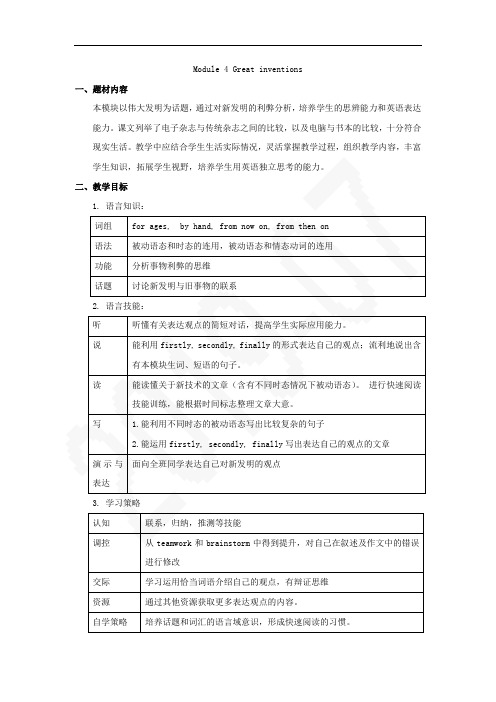
Module 4 Great inventions一、题材内容本模块以伟大发明为话题,通过对新发明的利弊分析,培养学生的思辨能力和英语表达能力。
课文列举了电子杂志与传统杂志之间的比较,以及电脑与书本的比较,十分符合现实生活。
教学中应结合学生生活实际情况,灵活掌握教学过程,组织教学内容,丰富4. 文化意识:中外对比:思维模式的比较,辩证地看问题。
三、重点和难点重点:1.被动语态与时态的连用2.被动语态与情态动词的连用难点:能用英语思维,并恰当地、地道地表达自己的观点。
四、单元内容分析Unit 1: Paper and printing have been used for ages本单元的主要任务是听和说。
通过听以及学习与创造发明有关的对话,学会向他人借东西的英语表达方法。
通过对传统杂志与网络杂志的比较,培养学生的英语思维,锻炼学生的英语表达能力。
主要句型有“C an I …?” “Do you mean doing … ?” “ Y ou must promise that…”Unit 2:Books could be produced more quickly and cheaply.本单元主要任务是阅读,理解文章段落大意,帮助学生养成良好的阅读习惯和有效的阅读方法,培养学生从文章当中按照时间顺序快速寻找有效信息的能力,着重练习归纳总结每一段中心大意的能力。
在教学过程中,教师可以先从整体上引导学生领会课文的大概结构和总体意思,然后分小组讨论每一段的大意,让学生按小组给出每一段的主要意思,然后进行纠正,让学生在自己解决问题的过程中发现问题,提出问题,最后解决问题。
Unit 3:Language in use本单元的主要任务是:通过动词练习让学生巩固被动语态与不同时态和句子类型配合使用时的使用方法,通过给词造句的方式,让学生熟悉被动语态在疑问句中的用法以及在和情态动词搭配时的用法。
五、教学方法本模块的主要任务是培养学生的英语表达能力和英语思维,应该多采取课堂讨论的形式来让学生大胆地表达他们关于一件事情的观点。
外研社九年级英语module 4Great inventions
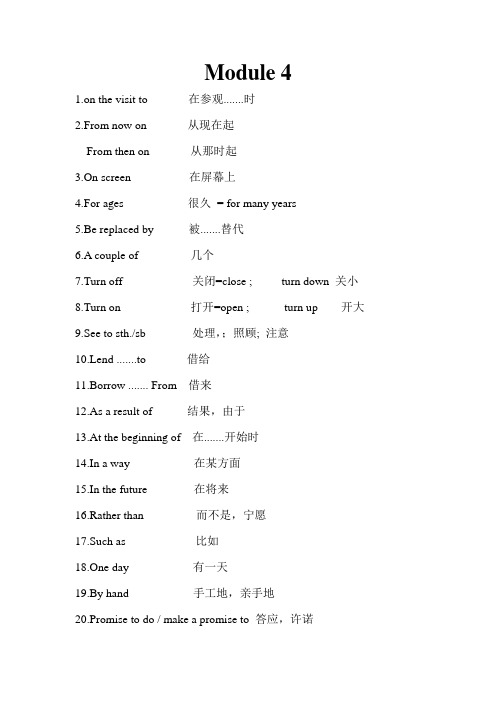
Module 41.on the visit to 在参观.......时2.From now on 从现在起From then on 从那时起3.On screen 在屏幕上4.For ages 很久= for many years5.Be replaced by 被.......替代6.A couple of 几个7.Turn off 关闭=close ; turn down 关小8.Turn on 打开=open ; turn up 开大9.See to sth./sb 处理,;照顾; 注意10.Lend .......to 借给11.Borrow ....... From 借来12.As a result of 结果,由于13.At the beginning of 在.......开始时14.In a way 在某方面15.In the future 在将来16.Rather than 而不是,宁愿17.Such as 比如18.One day 有一天19.By hand 手工地,亲手地20.Promise to do / make a promise to 答应,许诺21.Can I ask a favor? 可以请你帮忙吗22.Here it is. 在这里23.It doesn’t matter 没关系24.Is that clear? 清楚吗?25.Digital camera 数码相机26.On one’s way to 在去.......路上27.Look through 浏览,翻阅28.Go to sleep 去睡觉29.Be made of/from 由.......制成30.In those days / the past在那时31.Be likely to do sth 可能做某事32.Move on 继续前进33.One at a time 一次一个34.Throw away 扔掉35.Be used for...... 用来做......36.Fill .......with 用.......充满37.In ancient times 在古代38.Search for 搜索39.What’s more 而且40.Look like 看起来像41.It is said 据说42.Printing 印刷术print 印刷品43.Advantage 优点disadvantage缺点44.Ordinary 普通的,平常的an ordinary magazine 一本普通的杂志an ordinary person 一个普通人45.Charge v.充电charge the battery 给电池充电46.Favor n. 帮忙Can I ask a favor of you?请你帮个忙可以吗?You did me a great favor.你帮了我大忙。
九年级英语上册 Module 4 Great inventions Books can't be r

九年级英语上册 Module 4 Great inventions Books can't be replaced by computers文章背景材料外研版Books will never be completely replaced by computers. Computers can crash, and all information will be lost. If the power goes out in your house, you can’t read on your computer, but you can pick up a book. What you read on a computer is just light or something on a screen. A book is a permanent physical printing. If computers replaced books, we’d all have serious eye problems. The joy of reading would be lost. I'd hate to have to depend on a machine for my relaxing reading time. Books are forever, computers are until it breaks down, and everything will be lost. Books can be taken care of, as can computers, but there are books that are a hundred years old, I haven't heard of anyone with the same computer for even 10 years. I guess computers are getting new and better, but books are still better to read. However, on the up side for computers, one computer, can store over a hundred books. But if the one computer breaks, a hundred books break too. Computers are good, and should store that kind of stuff, but I don't think it should completely replace the book. That would really suck.1。
英语:Module 4 Great inventions好的课件(外研社九年级上)
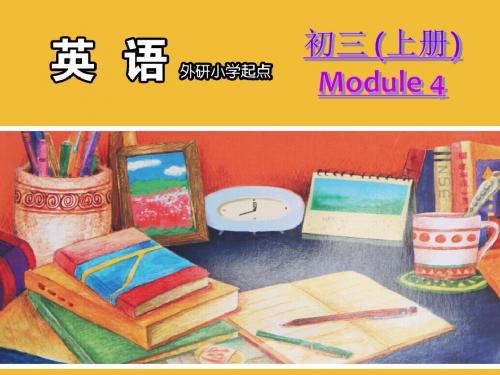
含情态动词的被动语态: can /may /must/should…+ be + P.P.
an ordinary magazine
普通的
the sixth issue
期
an online magazine
What is wrong with New standard?
Listen to the tape and answer the questions.
• Find out the phrases and useful sentences 1.Can I ask a favour ?
肯定回答:Sure/Of course/Certainly… 否定回答:I’m afraid not./I’m sorry ,but…
2.take some photos 3.from now on 4.What’s wrong with …? 5.It doesn’t matter . 6.I’ll see to it /that . 7.lend …to …
Module 4 Great inventions Unit 1 Paper and printing have been used for ages.
Words and expressions
printing advantage digital digital camera battery charge favour
printing
paper
They have been used for ages.
Two issues have been published.
They have been used for ages. It has been used for two years.
Module 4 Great inventions
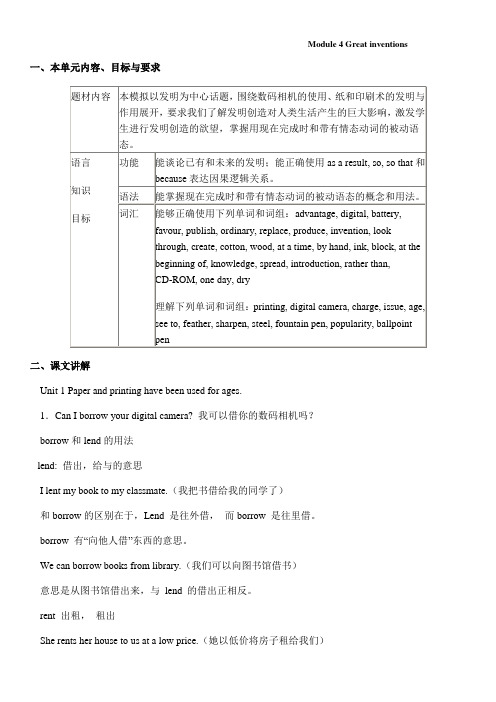
一、本单元内容、目标与要求二、课文讲解Unit 1 Paper and printing have been used for ages.1.Can I borrow your digital camera? 我可以借你的数码相机吗? borrow和lend的用法lend: 借出,给与的意思I lent my book to my classmate.(我把书借给我的同学了)和borrow的区别在于,Lend 是往外借,而borrow 是往里借。
borrow 有“向他人借”东西的意思。
We can borrow books from library.(我们可以向图书馆借书)意思是从图书馆借出来,与lend 的借出正相反。
rent 出租,租出She rents her house to us at a low price.(她以低价将房子租给我们)注意:rent在表示租用的意思的时候,一定是有价格的,如果是免费的则不可以用rent 一词。
比如:我免费用他的房子。
可以说,I occupy his house with free of charge.是不可以说成:He rents me the house with free of charge.use 使用的意思,普通用语May I use your pen?(我可以用你的笔吗?)2.Can books be replaled by computers? 书会被电脑所代替吗?replace的用法取代;以...代替[(+with/by)]The brakes have to be replaced. 刹车需要更换。
Electric lights have replaced candles. 电灯已经取代了蜡烛。
3.The battery hasn't been charged for a couple of months. 电池已经几个月没充电了。
九年级英语上册 Module 4 Great inventions造纸术文章背景材料 外研版
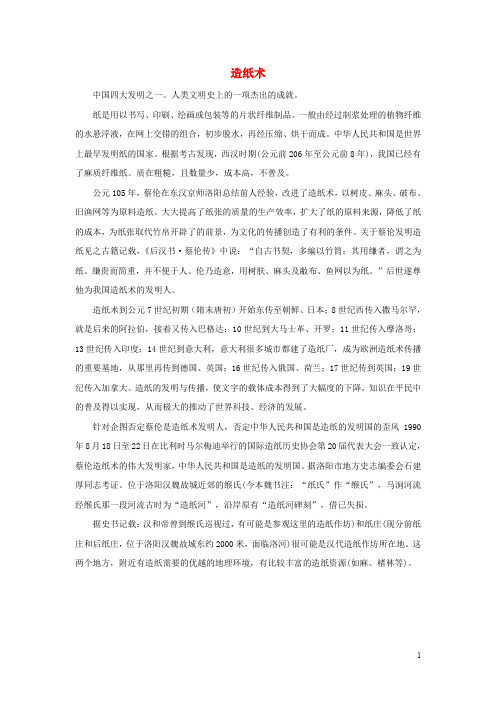
造纸术中国四大发明之一。
人类文明史上的一项杰出的成就。
纸是用以书写、印刷、绘画或包装等的片状纤维制品。
一般由经过制浆处理的植物纤维的水悬浮液,在网上交错的组合,初步脱水,再经压缩、烘干而成。
中华人民共和国是世界上最早发明纸的国家。
根据考古发现,西汉时期(公元前206年至公元前8年),我国已经有了麻质纤维纸。
质在粗糙,且数量少,成本高,不普及。
公元105年,蔡伦在东汉京师洛阳总结前人经验,改进了造纸术,以树皮、麻头、破布、旧渔网等为原料造纸。
大大提高了纸张的质量的生产效率,扩大了纸的原料来源,降低了纸的成本,为纸张取代竹帛开辟了的前景,为文化的传播创造了有利的条件。
关于蔡伦发明造纸见之古籍记载,《后汉书·蔡伦传》中说:“自古书契,多编以竹筒;其用缣者,谓之为纸。
缣贵而简重,并不便于人。
伦乃造意,用树肤、麻头及敝布、鱼网以为纸。
”后世遂尊他为我国造纸术的发明人。
造纸术到公元7世纪初期(隋末唐初)开始东传至朝鲜、日本;8世纪西传入撒马尔罕,就是后来的阿拉伯,接着又传入巴格达;10世纪到大马士革、开罗;11世纪传入摩洛哥;13世纪传入印度;14世纪到意大利,意大利很多城市都建了造纸厂,成为欧洲造纸术传播的重要基地,从那里再传到德国、英国;16世纪传入俄国、荷兰;17世纪传到英国;19世纪传入加拿大。
造纸的发明与传播,使文字的载体成本得到了大幅度的下降,知识在平民中的普及得以实现,从而极大的推动了世界科技、经济的发展。
针对企图否定蔡伦是造纸术发明人,否定中华人民共和国是造纸的发明国的歪风1990年8月18日至22日在比利时马尔梅迪举行的国际造纸历史协会第20届代表大会一致认定,蔡伦造纸术的伟大发明家,中华人民共和国是造纸的发明国。
据洛阳市地方史志编委会石建厚同志考证。
位于洛阳汉魏故城近郊的缑氏(今本魏书注:“纸氏”作“缑氏”,马涧河流经缑氏那一段河流古时为“造纸河”,沿岸原有“造纸河碑刻”,借已失损。
Module4GreatInventions教案新部编本

教师学科教案[ 20 – 20 学年度第__学期]任教学科:_____________任教年级:_____________任教老师:_____________xx市实验学校Module 4 Great Inventions寿光实验中学张爱琴Teaching Procedures:Step I: RevisionHave/has been + doneThis book/ discuss/ on telephoneIt/ buy/by thousands of peopleChildren/tell to read this bookThe book/ print/ again and againOther books /write /about this bookMust/can/may be read1.a) All students must read this book.b) This book _____________by all students.2.a)Everyone can understand his ideas.b) His ideas ________________by everyone.3.a)I could not fine her books anywhere.b) Her books ________________anywhere.4.a) For a long time, many people could not use computers.b) Computers__________________by many5.a) We can do the work now if you want.b) The work _____________now if you want.6.a) You must not take these magazines from the library.b) These magazines _________________from the library . Reading and vocabulary1. Talk in pairsWhat’s the advantages of both book and computers?Can books be replaced by computers?2. Read and get the main ideas of the paragraphsP1 c. Life on paper and in printP2 a. The world before booksP3. b. The invention of printingP4. d. Technology and booksP5. e. Can books be replaced by computers?Language Points1. looks through 浏览,温习Eg. He looked through many books in order to find the correct answer. 为了找到正确答案,他查阅了许多书籍.2. with–without 带有…/ 没有…e g. He found a house with many trees around.他找到了一所周围有许多树的房子.He went to school without breakfast today.他今天没有吃早饭就去上学了.3. be made of ----be made from---be made up of ---be made in------be made by—be made into –--Ex. 1. Look at the camera, Where is it ________________? Japan.2. The table is ____________wood, while paper is ___________wood.3. Our class is ______________twenty boys and twenty three girls.4. The metal can be ____________ a knife.5. This kind of car is _____________ many workers in the factory.4. write words on--make a book --in those days --at a time --by hand ---as a result ----Ex. 1. He could even eat three hamburgers ____________, ____________ he became very fat.2. This picture is produced ___________, so it’s very expensive.3. _______________ there were few people knew about computers.4. They tried to _____________ paper in order to ___________5. put…against 将…放进/刻进hold…against 将…贴到6. at the beginning of 在…初/ 开始时after that 然后,之后in a way 以…方式7. compare…. with…. 与….相比, 与….相媲美You can’t compare him with Tom, they’re different. as compared with…与…比较He’s really done better as compared with last term8. rather than 胜过,而不愿Eg. He would choose Sunday rather than Saturday.I would like to go with you rather than stay at home.prefer to do…rather than do…情愿…而不..9.be replaced by 被….所替代be read online 在网上阅读3. Make notes to complete the timeline.4. Answer the questions1.Why were books expensive and rare before the invention ofprinting?2.Why did ideas spread more quickly when books became cheaper?3.What can we use instead of books to get information?Answer the questionsUse the words in the box : create, develop, hold keep, produce, receive, spread1.When was paper first created? When do you think books were first created?2.Were books produced by hand or by machine at first?3. What was the paper held against?When was printing developed?5. What can be kept on CD-ROMs?6. What can be received online?7. How did ideas spread in the past? How do ideas spread today? Writing6. Complete the sentences1.Its hard to imagine life without paper or print because…2. Books could only be produced one at a time because…3. Books could be produced more quickly and cheaply after the 11th century because…4. We may not need books in the future because…5. Books will never be completely replaced by computers because…7. How to give reasons / resultsas a result, because, so, so that1.What was the result of books becoming cheaper?2.Why must printing be thought of as one of the most inventions?3.More people learned to read in the 11th century. What happened then?4.What development will mean that books won’t be needed in the future?8. Rewrite the notes in full sentencesHomeworkFinish the workbook exercisesWrite a passage according to the text。
最新外研版九年级上册《module 4 great inventions》全模块教案.doc

知识目标:Teaching Procedures:Step one:Revision 1)Talk about some great invention, recall the words of inventions:TV, computer, watch, radios, camera, digital camera, photo, mobile phone, internet….Teach: online magazine2) Recall what we have learned in the last ModuleStep two: Listening and vocabulary1. Talking: What’s the advantage of an online magazine?2. Listen and check the words3.Listen and read⑴ Play the tape to let the Students get the answer: Can the digital camerabe borrowed from Tony’s Dad?⑵Do Activity 4.Get the students to show their answers.⑶Listen and repeat.Notes:Everyday EnglishCan I ask a favour? 帮忙,赏光 Anyway…谈点别的,另外Here it is. 给你,在这儿 It doesn’t matter. 没关系I’ll see to that. 我会处理的。
Is that clear? 清楚吗?懂了吗? Promise! 我一定!language Points1) Paper and printing have bee n used for ages.for ages ---- for (many) years好多年了.类似短语: for hours/ days/months 等.2) The battery hasn’t been charged for a couple of months.a couple of --- several 几个3) I’ll see to it. 我来处理see to sb. / sth.= look after, deal with “处理, 照顾, 关照”4.) You must promise that it won’t be….promise to do/ that..= make a promise to do/that 答应, 许诺作某事Promise!= I promise to do that.我答应!5) turn on ----打开 turn off ----关闭turn up -----开大 turn down ---关小eg. Don’t forget to ___________the light when you leave the room.Please ___________the TV, the football is beginning.Would you please ________it ______ a little? I can’t hear it clearly. The baby is sleeping. Please _____________ the radio a little.4. Read the summary of the conversation. Underline the wrong information5. Answer the questionsAsk Ss to say their answers and check them together.6. Find the sentences in the conversation which mean…Grammar PointsWill (won’t_) + be +动词的过去分词为一般将来时的被动语态have/has (not) been + 动词的过去分词为现在完成时的被动语态情态动词+ be + 动词的过去分词为情态动词的被动语态Summary: 各种时态的被动语态构成一般现在时:S+ am/is /are + done一般过去时:S+ was/were + done一般将来时:S+ will + be + done情态动词:S+can/may/must/should+be+done现在进行时: S+ am/ is/ are + being+ done过去进行时: S+ was/were + being+ done现在完成时:S+ have/has + been+ donePronunciation and SpeakingListen to the sentences and repeat.Homework:Finish work book 1-3附加练习:中英互译:I’ll see to that._______________ 帮个忙________________ Promise. ________________ 照相________________look after________________ 好几个________________turn off________________ 几年________________Here it is. ________________ 由….代替________________改为被动语态句子1. They have published two issues of this magazine.2. Betty has kept my watch for two days.3. I’ll charge the battery for your MP3 players.4. I could not find my bag anywhere.Teaching Procedures:Step I: RevisionHave/has been + doneThis book/ discuss/ on telephoneIt/ buy/by thousands of peopleChildren/tell to read this bookThe book/ print/ again and a gainOther books /write /about this bookMust/can/may be done1. a) All students must read this book.b) This book _____________by all students.2. a) Everyone can understand his ideas.b) His ideas ________________by everyone.3. a)I could not fine her books anywhere.b) Her books ________________anywhere.4. a) For a long time, many people could not use computers.b) Computers__________________by many5. a) We can do the work now if you wa nt.b) The work _____________now if you want.6. a) You must not take these magazines from the library.b) These magazines _________________from the library . Reading and vocabulary1. Talk in pairsWhat are the advantages of both book and computers?Can books be replace d by computers?2. Read and get the main ideas of the paragraphsP1 c. Life on paper and in printP2 a. The world before booksP3. b. The invention of printingP4. d. Technology and booksP5. e. Can books be replaced by computers?Language Points1. looks through 浏览,温习2. with– without 带有… / 没有…3. be made of ---- be made from--- be made up of --- be made in------ be made by— be made into –--4. write words on-- make a book -- in those days --at a time -- by hand --- as a result ----5. put… against 将…放进/刻进 hold… against 将…贴到6. at the beginning of 在…初/ 开始时7. after that 然后,之后 in a way 以…方式pare…. with…. 与….相比 , 与….相媲美9. rather than 胜过,而不愿 prefer to do… rather than do…情愿…而不..10.be replaced by 被….所替代 b e read online 在网上阅读3. Make notes to complete the timeline.4. Answer the questions1. Why were books expensive and rare before the i nvention of printing?2. Why did ideas spread more quickly when books became cheaper?3. What can we use instead of books to get information? HomeworkFinish the workbook exercisesPart I: RevisionLanguage practice现在完成时的被动语态: have/has(not) been +过去分词情态动词的被动语态:情态动词(not)+ be +过去分词Conclusion被动语态的构成:be +动词的过去分词一般现在时—— am/is / are +动词的过去分词一般过去时—— was/were +动词的过去分词情态动词—— aux.v. (must/can/could/may…)+ be +动词的过去分词现在进行时—— be(am、is、are)+being +动词的过去分词一般将来时—— will be/be going to be +动词的过去分词现在完成时—— have/has +been+动词的过去分词主动语态改成被动语态的步骤及注意事项1. 主动语态的宾语改成被动语态的主语。
Module 4 Great inventions

A 从现在起 B 很长时间 C 请求帮忙 D 好几个 E 意味着 F 处理,照顾, G 答应作某事 H 关闭
( F)
Read and find out the answers.
1.What would tony like to do with the camera?
2.Tony would like to take photos for what?
3.Why the school magazine will be an online magazine?
Make an online magazine
1. paper 2. school website 3. on screen
PKΒιβλιοθήκη ➢Describe how the inventions have changed your life. My life has been changed by email because I can …
Module 4 Great inventions Unit 1 Paper and printing has
been used for ages.
Talk something about the pictures.
An
An
ordinary magazine online magazine
Match
4. What’s the matter with the camera? 5.How will Tony look after the camera?
- 1、下载文档前请自行甄别文档内容的完整性,平台不提供额外的编辑、内容补充、找答案等附加服务。
- 2、"仅部分预览"的文档,不可在线预览部分如存在完整性等问题,可反馈申请退款(可完整预览的文档不适用该条件!)。
- 3、如文档侵犯您的权益,请联系客服反馈,我们会尽快为您处理(人工客服工作时间:9:00-18:30)。
Module 4 Great inventions一、本单元内容、目标与要求二、课文讲解Unit 1 Paper and printing have been used for ages.1.Can I borrow your digital camera? 我可以借你的数码相机吗?borrow和lend的用法lend: 借出,给与的意思I lent my book to my classmate.(我把书借给我的同学了)和borrow的区别在于,Lend 是往外借,而borrow 是往里借。
borrow 有“向他人借”东西的意思。
We can borrow books from library.(我们可以向图书馆借书)意思是从图书馆借出来,与lend 的借出正相反。
rent 出租,租出She rents her house to us at a low price.(她以低价将房子租给我们)注意:rent在表示租用的意思的时候,一定是有价格的,如果是免费的则不可以用rent 一词。
比如:我免费用他的房子。
可以说,I occupy hi s house with free of charge.是不可以说成:He rents me the house with free of charge.use 使用的意思,普通用语May I use your pen?(我可以用你的笔吗?)2.Can books be replaled by computers? 书会被电脑所代替吗?replace的用法取代;以...代替[(+with/by)]The brakes have to be replaced. 刹车需要更换。
Electric lights have replaced candles. 电灯已经取代了蜡烛。
3.The battery hasn't been charged for a couple of months. 电池已经几个月没充电了。
a couple of 几个a couple of+n(c).作主语时谓语动词通常用单数它有两个含义1)两个e.g. There i s a couple of boys waiting for you.2)一些,几个e.g. I don't know why I feel so tired, I only had a couple of drinks.4.What's wrong with an ordinary? 普通杂志怎么了?What's wrong with…?=What's the matter with…?=What's up?=What's the problem?5.It doesn't matter. I'll see to that. 没关系,我会处理的。
It doesn't matter 通常用于回复别人的歉意—I'm sorry. I broke you pen just now. 对不起,刚才我摔坏了你的钢笔。
—It doesn't matter. 没关系。
Unit 2 Books could be produced more quickly and cheapl y.1.Every evening my mother looks through magazines at home.每天晚上,妈妈在家翻阅杂志。
look through 浏览A、I gave her article a quick look-through.她的文章我匆匆读过一遍。
B、Be it helpful to look through the newspaper?浏览报纸有帮助吗?C、look through a book or other written material.审核书或者其他的写作材料。
2.…and has been made from silk, cotton………使用的原材料有丝、棉花……be made of/ be made from/ be made in/ be made into(1)be made of表示“由…制成”, 一般指能够看出原材料,或发生的是物理变化。
A、Thi s table cl oth is made of paper. 这张桌布是由纸做的。
B、This salad i s made of apples and strawberries. 这种沙拉是由苹果和草莓做的。
(2)be made from也表示“由…制成”,但一般指看不出原材料,或发生的是化学变化。
A、Bread i s made from corn. 面包是小麦做的。
B、The lifeboat is made from some special material. 这个救生艇是由某种特殊材料制成的。
(3)be made in指的是产地,意思为“于…制造”。
A、The caps are made in Russia. 这些帽子产于俄罗斯。
B、My mother likes to buy things which are made in China. 我妈妈喜欢买中国产的东西。
(4)be made into的意思为“被制成为…”。
A、Thi s piece of wood will be made into a small bench. 这块木头将要被制成一个小凳。
B、The paper has been made into clothes for the doll. 纸被做成了洋娃娃的衣服。
3.When printing was developed greatly at the beginning of 11th century, books could be produced more quickly and cheaply. 印刷术在11世纪初有了很大发展,书的印刷也快了许多,便宜了许多。
devel op的用法devel op 作形容词时,devel oping表发展中,而developed表发达比如China is a developing country, but the US is a developed country .at the beginning of 在……开始At the beginning of thi s term, I want to learn English. 在开学初,我想学英语。
4.Can I ask a favour?这是请求帮助的一种表达方式,类似的说法还有:A、Coul d you do me a favour?B、May I ask a favour of you?C、Could you help me, please? 等。
5.Paper and printing have been used for ages.be/get used for意思是“被应用”,use在这里是被动语态。
常见的带use的短语有:be/get used to意思是“习惯于”。
如:Slowly their eyes got used to the darkness.used to(构成谓语)过去常常。
如:There used to be a baker's shop in the village.6.Can books be replaced by computers?be replaced by意思是“被……所取代”。
如:The broken chair was replaced by a new one.7.The battery hasn't been charged for a couple of months.charge在这里的意思是“给某物充电”。
如:Is your car battery charged easily?8.I'll see to that.see to sth. 意思是“照看或处理某事物”。
如:This machine isn't working. Get a mechanic to see to it.9.Every evening my mother looks through magazines at home.look through在这里译为“仔细看一看”,带有look的常见短语还有:look after(照看,照管),look at(看,瞧),look for(寻找),look forward to(盼望),look into(研究,调查),look over(检阅,检查),look up(查询,查找)等。
Unit 3 Language on use1.现在完成时情态动词的被动语态(定义见课本)练习1.Complete the sentences with the correct form of the words.Paper has been made (make) from many things.1.I think one day books may_____ (replace) by computers.2.My bike _____ (leave) at school, so I have to take the bus to school today.3.The battery ______ (charge) yet. How can I use my recorder?4.Paper should not ______ (throw) away.5.Books and CDs can ______ (borrow) from the library.6.I've bought an MP3 player — and about 1,000 songs have _____ (download) into it! 7.Has the pen _____ (mend) yet? I need to write my article with it.8.What have _____ (turn on)? The radio?Answers1.Be replaced2.Was left3.hasn't been charged4.be thrown5.be borrowed6.been downloaded7.been mended8.been turned onMake questions and write answers.what/ shouldn't/ do/ with batteries? (throw away)—What shouldn't be done with batteries?—They shouldn't be thrown away.1.what/ can/ use/ to make paper? (many things)2.what/ might/ use/ to replace books one day? (computers)3.where/ can/ music/ keep? (on MP3 players)Answers1.What can be used to make paper?Many things can be used (to make paper).2.What might be used to replace books one day?Computers might be used (to replace books one day).3.Where can music be kept?It can be kept on MP3 players.三、课文译文Unit 1 Paper and printing have been used for ages.托尼:爸爸,您能帮个忙吗?我可以借用一下您的数码相机吗?托尼的爸爸:做什么?托尼:我想在下周全校学生参观博物馆的时候拍些照片。
